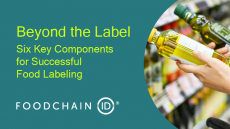Cantaloupe listeria scare still affecting US recalls - ExpertRECALL

A total of 176 food recalls covering nearly 70m units were initiated by 150 companies in the US between October and December 2011 (Q4), according to a report by recall activity tracker ExpertRECALL.
Nearly 70m food units were affected by the recalls compared with Q3 – an 80% increase on the 40m units recalled in the midst of the Jensen Farms-related Listeria monocytogenes outbreak in September.
During Q3, the period between July and September, 117 documented food recalls were reported to the US Food and Drug Administration (FDA).
According to ExpertRECALL, 50% of Q4 recalls were Class I - where there is a reasonable probability that the product will cause serious adverse health consequences or death.
Greater FDA scrutiny
“While it is impossible to know for sure whether the Jensen Farms recall led to an increase in Listeria-related recalls, we can say that it caused regulators and the industry to take a closer look at how foodborne illness outbreaks are investigated,” ExpertRECALL CEO Mike Rozembajgier told FoodQualityNews.com.
“Recent foodborne illness outbreaks, such as the one that led to the Jensen Farms cantaloupe recall, have led a number of politicians and consumer advocacy groups to question the FDA’s ability to effectively oversee food safety.”
“We can’t say for sure whether this is because of an increase in safety problems or greater FDA scrutiny. But, from our experience, it is probably a bit of both.”
Potential Listeria monocytogenes contamination was the second biggest cause of FDA recalls in the quarter.
The pathogen, which was the cause of the worst foodborne contamination in modern US history, accounted for 20 recalls in the fourth quarter.
A 2011 contamination, which was traced back to tainted cantaloupes from Colorado-based Jensen Farms, infected a total of 146 people and killed 30.
Continued FDA pressure
Despite concerns over the agency’s ability to address food safety, the increased recall activity shows that the FDA remains active, Rozembajgier added.
“The FDA’s increasing emphasis on outbreak investigations will keep up the pressure on the food industry to ensure the safety of its products. We may see food manufacturers and retailers being more cautious when deciding whether to recall possibly unsafe food items.”
“It’s hard to predict the level of recall activity we will see in coming quarters. But whether or not the number or magnitude of recalls increases, we do expect the regulatory agencies to keep a close eye on food safety,” he added.

















